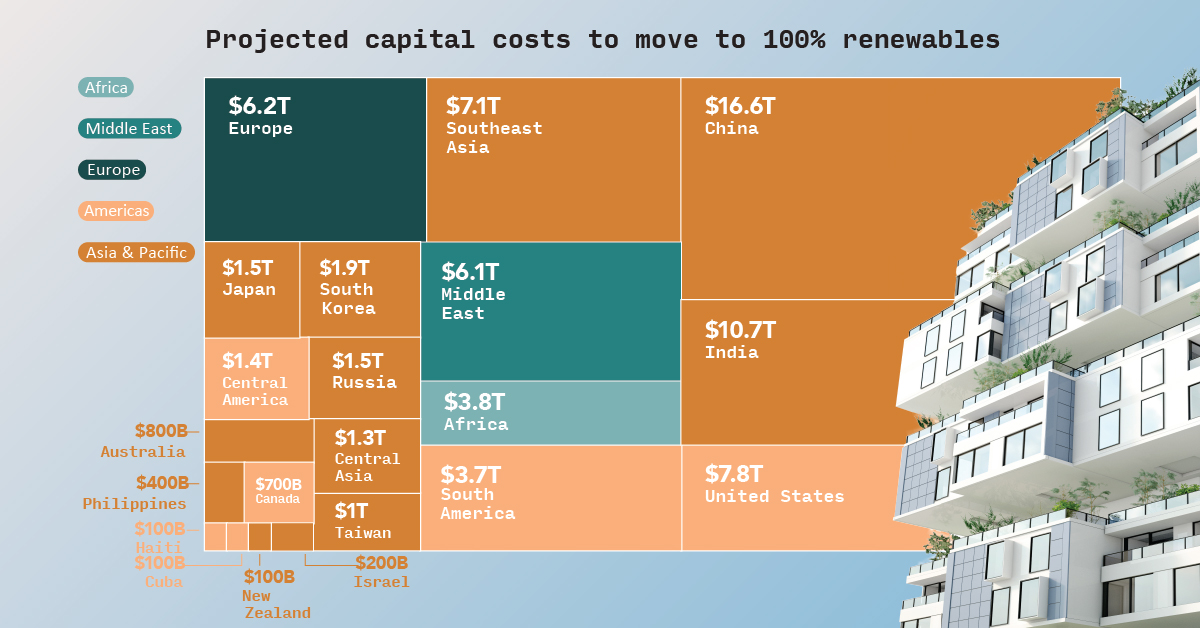3 Ways the Accommodation Sector is Making the Journey to Net Zero
3 Ways the Accommodation Sector is Moving Towards Net Zero
Accommodations, like hotels and resorts, collectively account for an estimated 264 million tonnes CO2-eq in direct and controllable emissions, also known as scope 1 and scope 2 emissions.
To meet this challenge, our sponsor Booking.com, together with EY-Parthenon, produced a road map to decarbonize the sector by 2050.
The infographic above is based on this report and shows how the accommodations sector could lead the way to a net zero future for the entire travel sector.
Many Roads to a Net Zero Future
In an industry as diverse as global travel and tourism, there will be many different roads to zero emissions, some easier, and some harder.
According to the World Travel and Tourism Council, accommodations and in-destination activities have an opportunity to be decarbonization leaders, and reach net zero between 2030 and 2040. This is because of their relatively low dependency on fossil fuels and wide scope to adopt existing carbon-saving technologies.
Airlines and cruise ship operators, on the other hand, will be among the last to decarbonize. Their high carbon emissions and few scalable zero emission alternatives mean that they won’t reach net zero until 2040 at the earliest, with the industry average at 2050.
Conversely, online travel agencies and travel agencies occupy an easy-to-abate corridor and could reach net zero between 2025-2030. Booking.com for example became carbon neutral in 2020.
But How Can Accommodations Get There?
The recent study by EY-Parthenon (commissioned by Booking.com) has laid out a road map to net zero for the accommodation sector.
Here are the three key ways that it can be achieved:
1. Leverage Existing Carbon-Saving Measures
A future that limits climate change to 1.5 degrees Celsius above pre-industrial levels means that net zero hotels could become the rule and not the exception. And part of that journey will mean adopting existing carbon-saving measures, like key card switches and improving insulation.
Some of these measures are now industry standards, like energy-efficient lighting, which has been adopted by over 80% of accommodations. Overall, these measures have a 45% global adoption rate and have already eliminated 39 million tonnes CO2-eq.
Adopting all of these carbon-saving practices sector-wide could reduce direct and controllable emissions by a further 48 million tonnes CO2-eq. This would come at a substantial cost, however, at about $243 billion or $4,750 per room.
2. Green the Grid
Moving the needle on the remaining 216 million tonnes CO2-eq could rest in the shift to renewable energy.
Given the falling price of renewables, many operations could decide to produce their own power onsite. However, if every accommodation placed solar panels on their roofs, it would only abate around 33 million tonnes CO2-eq or around one-sixth of the remainder.
“Greening the grid” is a core pillar of the decarbonization agenda and matters for every sector of the global economy, not just accommodations. A Stanford University study from 2019, based on 2013 data, has calculated that to move the world’s electricity grid to 100% renewables will cost a staggering $72.8 trillion. For China the price tag of doing this is a hefty $16.6 trillion and for Canada a “mere” $700 billion.
Zooming in on the cost to decarbonize electricity for the accommodation sector, EY-Parthenon estimated the cost at $525 billion.
3. Change Consumer Attitudes
Recent surveys have found that consumers are thinking more and more about sustainability when it comes time to make travel decisions. More than three-quarters of global travelers intend to stay in a sustainable property at least once in the coming year, while 71% want to make more of an effort to travel sustainably.
However, these attitudes aren’t translating into travelers making trips more sustainably, at least not yet. And maybe this shouldn’t be a surprise, given that 35% of travelers think of vacations as special times to relax, without thinking about sustainability, and that a further 27% report that sustainable travel doesn’t provide the luxury or comfort they seek.
Getting Consumers Onboard
Addressing this ‘say-do’ gap will be critical and the World Economic Forum research has identified six areas that are holding consumers back from traveling more sustainably:
- Limited availability of sustainable travel options.
- Lack of awareness by consumers of travel and tourism’s sustainability challenges.
- Low credibility and lack of trust of sustainability claims.
- Price premium associated with sustainable travel options.
- Cumbersome purchase experiences can dissuade consumers from making the leap.
- Lack or rewards or acknowledgment for consumers that do choose to travel sustainably.
By making it easier for consumers to travel sustainably, the accommodation sector could unlock a self-reinforcing flywheel of decarbonization, where increased consumer demand for sustainable travel spurs more supply, which in turn brings more consumers on board, and on and on into a net zero future.
On the Road to Net Zero
It’s a big job, to be sure, but the accommodation sector has a plan to reach net zero by 2050.

Download The Road to Net Zero report to learn more about how accommodations can accelerate the sector’s green transition.

-

 Green2 weeks ago
Green2 weeks agoTop Countries By Forest Growth Since 2001
One country is taking reforestation very seriously, registering more than 400,000 square km of forest growth in two decades.
-
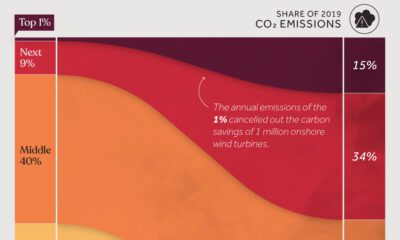
 Green4 months ago
Green4 months agoCharted: Global CO2 Emissions by Income Group
We visualize global CO2 emissions by income group, showing the impact of different wealth brackets on carbon generation.
-

 Green10 months ago
Green10 months agoHotter Than Ever: 2023 Sets New Global Temperature Records
Four days straight in July 2023 set or equaled global temperature records on average.
-
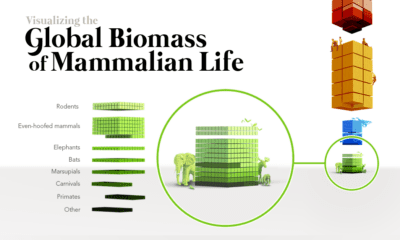
 Science12 months ago
Science12 months agoVisualizing the Biomass of All the World’s Mammals
When the world’s biomass—the stuff we’re made of—is tallied up, humans and cattle outweigh wild mammals by a massive margin.
-
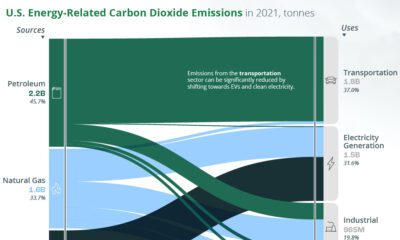
 Green1 year ago
Green1 year agoVisualizing the Flow of Energy-Related CO2 Emissions in the U.S.
A look at the flow of energy-related CO2 emissions from the sources that generate energy to the sectors that use it.
-
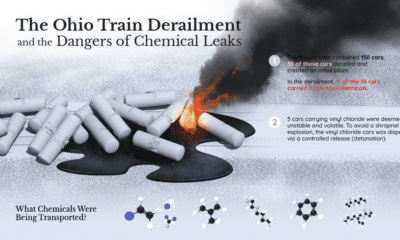
 Misc1 year ago
Misc1 year agoExplainer: What to Know About the Ohio Train Derailment
A train transporting a number of potentially dangerous chemicals derailed near the Ohio–Pennsylvania border. This infographic explains what happened



